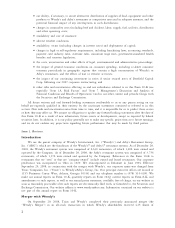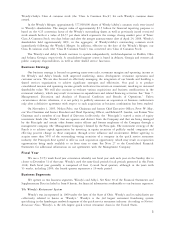Wendy's 2008 Annual Report Download - page 20
Download and view the complete annual report
Please find page 20 of the 2008 Wendy's annual report below. You can navigate through the pages in the report by either clicking on the pages listed below, or by using the keyword search tool below to find specific information within the annual report.identity of any two of the individuals holding the titles of Chief Executive Officer, Chief Operating Officer or
Chief Administrative Officer of ARG in any period of 36 months. See Note 29 of the Financial Statements and
Supplementary Data included in Item 8 herein, for further information on the Management Agreement with
AFA.
In addition to their contributions to the AFA, ARG and Arby’s domestic franchisees are also required to
spend a reasonable amount, but not less than 3% of gross sales of their Arby’s restaurants, for local advertising.
This amount is divided between (i) individual local market advertising expenses and (ii) expenses of a
cooperative area advertising program. Contributions to the cooperative area advertising program, in which both
company-owned and franchisee-owned restaurants participate, are determined by the local cooperative
participants and are generally in the range of 3% to 7% of gross sales. Domestic franchisee participants in our
SMI program are not, however, required to make any expenditure for local advertising until their restaurants
have been in operation for 36 months.
General
Governmental Regulations
Various state laws and the Federal Trade Commission regulate Wendy’s and Arby’s franchising activities.
The Federal Trade Commission requires that franchisors make extensive disclosure to prospective franchisees
before the execution of a franchise agreement. Several states require registration and disclosure in connection
with franchise offers and sales and have “franchise relationship laws” that limit the ability of franchisors to
terminate franchise agreements or to withhold consent to the renewal or transfer of these agreements. In
addition, Wendy’s and Arby’s and their respective franchisees must comply with the federal Fair Labor
Standards Act and the Americans with Disabilities Act (the “ADA”), which requires that all public
accommodations and commercial facilities meet federal requirements related to access and use by disabled
persons, and various state and local laws governing matters that include, for example, the handling, preparation
and sale of food and beverages, the provision of nutritional information on menu boards, minimum wages,
overtime and other working and safety conditions. Compliance with the ADA requirements could require
removal of access barriers and non-compliance could result in imposition of fines by the U.S. government or an
award of damages to private litigants. As described more fully under “Item 3. Legal Proceedings,” one of
ARG’s subsidiaries was a defendant in a lawsuit alleging failure to comply with Title III of the ADA at
approximately 775 company-owned restaurants acquired as part of the July 2005 acquisition of the RTM
Restaurant Group. Under a court approved settlement of that lawsuit, we estimate that ARG will spend
approximately $1.15 million per year of capital expenditures over a seven-year period which commenced in
2008 to bring these restaurants into compliance with the ADA, in addition to paying certain legal fees and
expenses. We do not believe that the costs related to this matter or any other costs relating to compliance with
the ADA will have a material adverse effect on the Company’s consolidated financial position or results of
operations. We cannot predict the effect on our operations, particularly on our relationship with franchisees, of
any pending or future legislation.
Environmental Matters
Our past and present operations are governed by federal, state and local environmental laws and
regulations concerning the discharge, storage, handling and disposal of hazardous or toxic substances. These
laws and regulations provide for significant fines, penalties and liabilities, sometimes without regard to
whether the owner or operator of the property knew of, or was responsible for, the release or presence of the
hazardous or toxic substances. In addition, third parties may make claims against owners or operators of
properties for personal injuries and property damage associated with releases of hazardous or toxic substances.
We cannot predict what environmental legislation or regulations will be enacted in the future or how existing
or future laws or regulations will be administered or interpreted. We similarly cannot predict the amount of
future expenditures that may be required to comply with any environmental laws or regulations or to satisfy
any claims relating to environmental laws or regulations. We believe that our operations comply substantially
with all applicable environmental laws and regulations. Accordingly, the environmental matters in which we
are involved generally relate either to properties that our subsidiaries own, but on which they no longer have
any operations, or properties that we or our subsidiaries have sold to third parties, but for which we or our
subsidiaries remain liable or contingently liable for any related environmental costs. Our company-owned
Wendy’s and Arby’s restaurants have not been the subject of any material environmental matters. Based on
12
























